“My no-fail prescription for personal and political health is to take a vitamin E capsule once a day, an evening constitutional, [and] at least a couple of twelve-ounce elbow bends.” — Jim Hightower
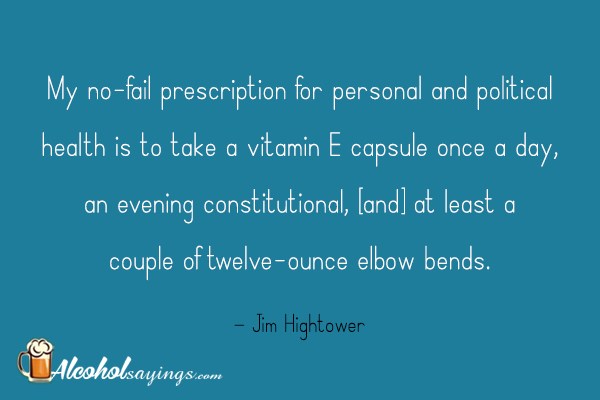
“My no-fail prescription for personal and political health is to take a vitamin E capsule once a day, an evening constitutional, [and] at least a couple of twelve-ounce elbow bends.” — Jim Hightower

“This seems to be the era of gratuitous inventions and negative improvements. Consider the beer can. It was beautiful — as beautiful as the clothespin, as inevitable as the wine bottle, as dignified and reassuring as the fire hydrant. A tranquil cylinder of delightfully resonant metal, it could be opened in an instant, requiring only the application of a handy gadget freely dispensed by every grocer. Who can forget the small, symmetrical thrill of those two triangular punctures, the dainty piff, the little crest of suds that foamed eagerly in the exultation of release?” — John Updike, in The Beer Can, 1964
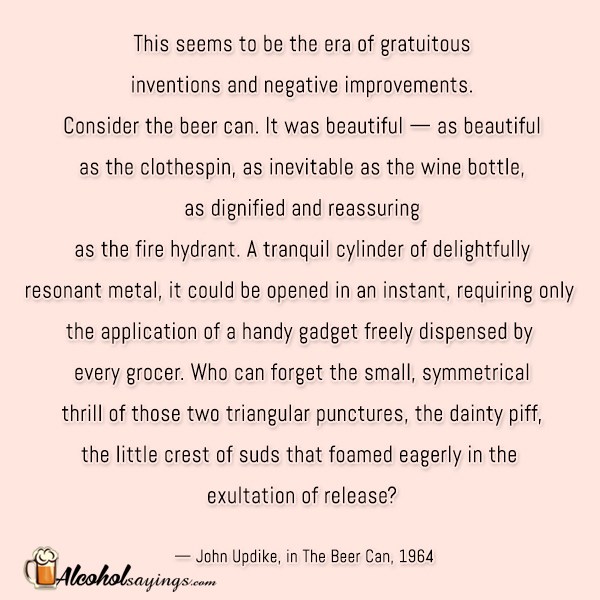
“Crabs will be on the table, mountain high, and there will be some of the best beer you ever tasted. This brew, indeed, almost makes me weep. It is the noblest, by far, ever broached in my house — a full-bodied semi-Dunkles, not too bitter and yet not too sweet, running about 5% of ethyl alcohol by volume. I shall reserve 30 bottles for you.” — H.L. Mencken, in a letter to a friend

“Go and seek nature in some quiet, secluded place, and forget everything for a fortnight or two except your clothes and a half dozen cases of beer. Rest! Nature! Beer!” — James Oliver Curwood, in Flower of the North, 1912
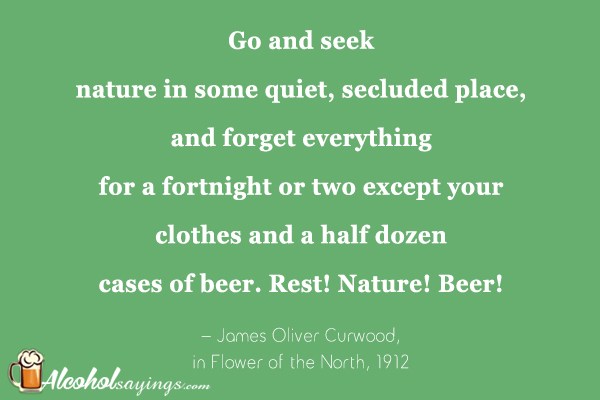
“Instead of water we got here a draught of beer, which, it was allowed, would be better; clear and thin, but strong and stringent as the cedar-sap. It was as if we sucked at the very teats of Nature’s pine-clad bosom in these parts… the topmost, most fantastic, and spiciest sprays of the primitive wood, and whatever invigorating and stringent gum or essence it afforded steeped and dissolved in it, — a lumberer’s drink, which would acclimate and naturalize a man at once, — which would make him see green, and, if he slept, dream that he heard the wind sough among the pines.” — Henry David Thoreau, writing about spruce beer in The Maine Woods, 1846
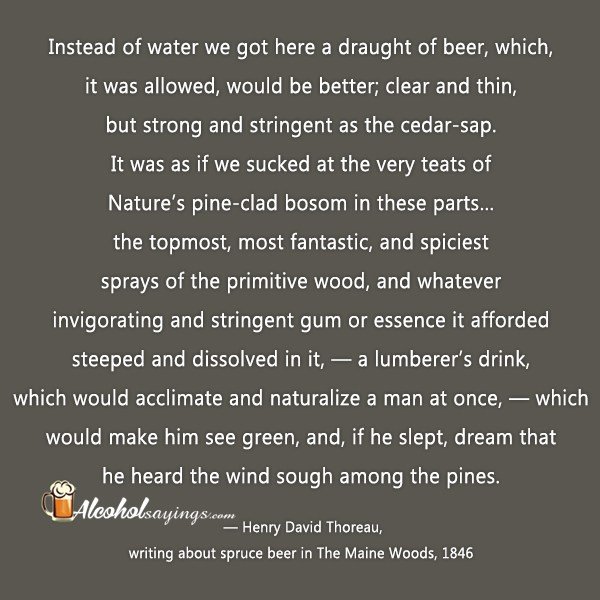
“The soldiers… had a saying, that the Quakers used the word “tired” in place of the word “drunk.” Whether any of them do ever get tired themselves, I know not; but at any rate, they most resolutely set their faces against the common use of spirits… and I am very happy to know, that beer is, every day, becoming more and more fashionable… I was pleased to see excellent beer in clean and nice pewter pots. Beer does not kill. It does not take the color from the cheek. It will make men tired, indeed, by midnight; but it does not make them half dead in the morning.” — William Cobbett, A Year’s Residence in America, 1818
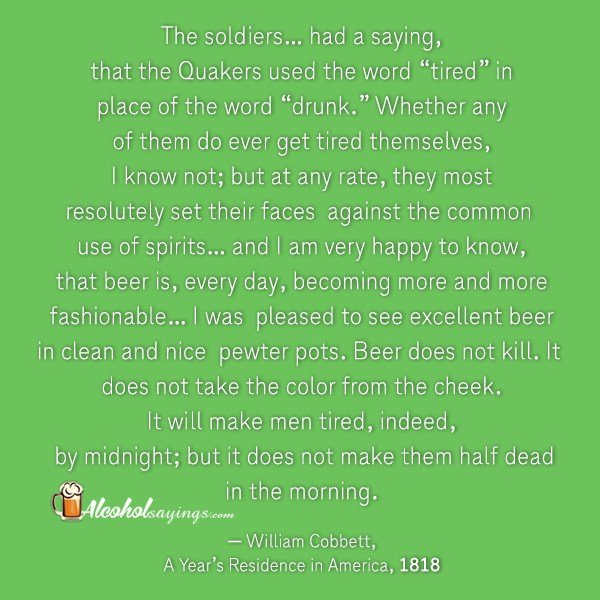
As to Squire Western, he was seldom out of the sick-room… Nay, he would sometimes retire hither to take his beer, and it was not without difficulty that he was prevented from forcing Jones to take his beer too; for no quack ever held his nostrum to be a more general panacea than he did this; which, he said, have more virtue in it than was in all the physic in an apothecary’s shop.” — Henry Fielding, in Tom Jones, 1749

“Just give me some beer and the road and I’m together!” — S. Clay Wilson
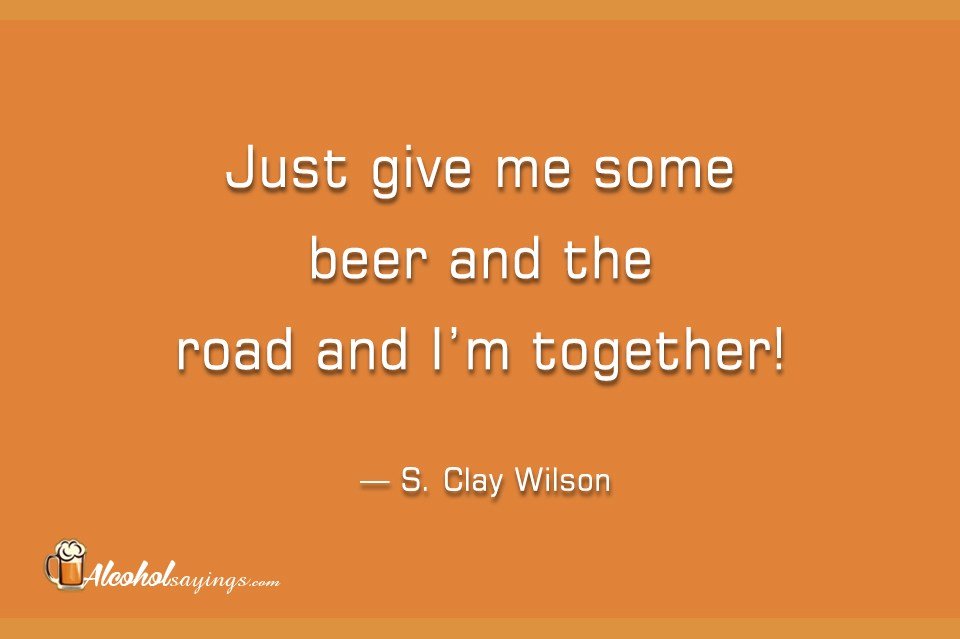
“”Would you like some ice tea?” she asks. “Unless you’ve got a bottle of beer that’s not working.” — Raymond Chandler, in Double Indemnity, 1944
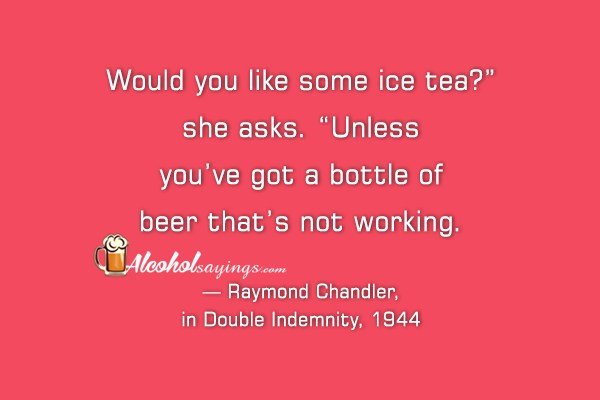
“For a moment, Trina stood looking at him as he lay thus, prone, inert, half dressed, and stupefied with the heat of the room, the steam beer, and the fumes of the cheap tobacco.” — Frank Norris, in McTeague: Story of San Francisco, 1899
